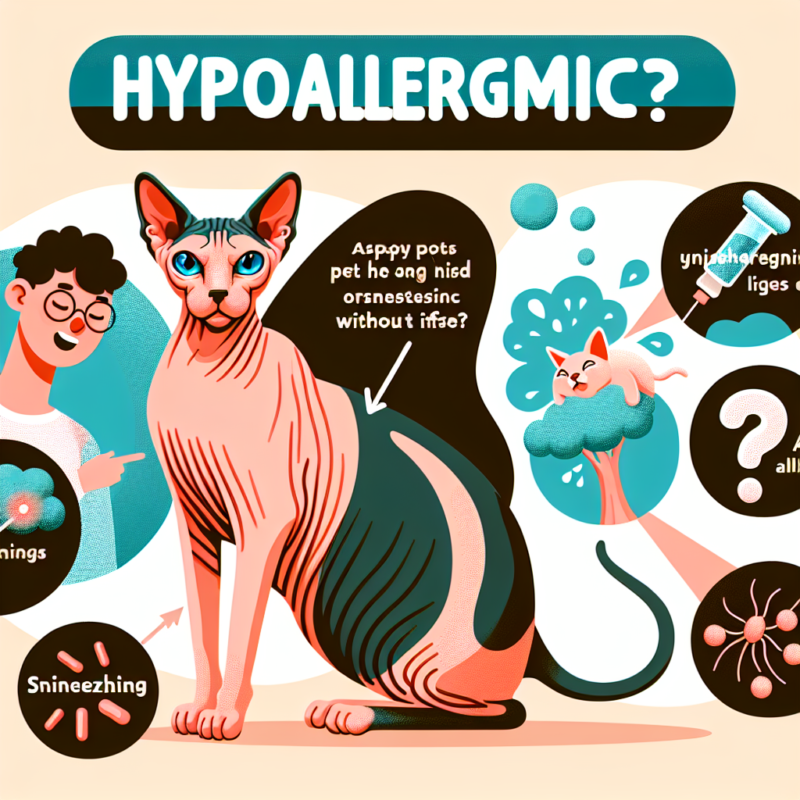Blog
are sphynx cats hypoallergenic
The Truth About Sphynx Cats and Allergies: What You Need to Know

Sphynx cats are a unique and fascinating breed known for their hairless appearance. They have gained popularity in recent years, with many people drawn to their distinctive look and playful personalities. However, one question that often arises when considering adopting a Sphynx cat is whether or not they are hypoallergenic. In this article, we will explore the truth about Sphynx cats and allergies, and what you need to know before bringing one into your home.
First and foremost, it is important to understand what hypoallergenic means. The term hypoallergenic is often used to describe animals that are less likely to cause an allergic reaction in humans. However, it is important to note that there is no such thing as a completely hypoallergenic cat. All cats produce allergens, which are proteins found in their saliva, urine, and dander (dead skin cells). These allergens can trigger allergic reactions in some people, regardless of the breed.
With that being said, Sphynx cats are often considered to be more hypoallergenic than other breeds. This is because they have little to no hair, which means they produce less dander. However, it is important to note that Sphynx cats still produce allergens, just like any other cat. So, while they may be a better option for those with allergies, they are not completely allergen-free.
Another factor to consider is that allergies are not solely caused by a cat’s fur. Allergens can also be found in a cat’s saliva and urine, which can be transferred to their skin during grooming. This means that even though Sphynx cats have no fur, they can still trigger allergies in some people. It is also worth noting that allergies are unique to each individual, so while one person may have no reaction to a Sphynx cat, another person may still experience allergies.
One of the main reasons why Sphynx cats are often considered to be hypoallergenic is because they require regular bathing. This is due to the fact that without fur, their skin can become oily and produce excess dander. Regular bathing can help to reduce the amount of dander on a Sphynx cat’s skin, making them a better option for those with allergies. However, it is important to note that bathing a cat too frequently can also cause skin irritation, so it is important to find a balance.
In addition to regular bathing, there are other steps that can be taken to reduce allergens in a Sphynx cat’s environment. This includes keeping their litter box clean, vacuuming regularly, and using air purifiers. These measures can help to reduce the amount of allergens in the air, making it easier for those with allergies to coexist with a Sphynx cat.
It is also important to consider the individual cat when it comes to allergies. Just like humans, each cat has its own unique personality and characteristics. This means that while one Sphynx cat may be more hypoallergenic than another, it ultimately depends on the individual cat and how their body produces allergens.
In conclusion, while Sphynx cats may be a better option for those with allergies, they are not completely hypoallergenic. They still produce allergens, just like any other cat, and it ultimately depends on the individual cat and the individual’s allergies. Regular grooming and cleaning can help to reduce allergens in a Sphynx cat’s environment, but it is important to understand that there is no such thing as a completely hypoallergenic cat. If you are considering adopting a Sphynx cat, it is important to do your research and consult with a veterinarian to determine if it is the right fit for you and your allergies.
5 Things to Consider Before Adopting a Sphynx Cat If You Have Allergies
Sphynx cats are a unique and fascinating breed known for their hairless appearance and affectionate personalities. However, for those who suffer from allergies, the decision to adopt a Sphynx cat may not be an easy one. While many people believe that Sphynx cats are hypoallergenic, the truth is a bit more complicated. Before making the decision to bring a Sphynx cat into your home, there are a few important things to consider.
1. Understand the meaning of hypoallergenic.
The term hypoallergenic is often used to describe animals that are less likely to cause an allergic reaction in humans. However, it is important to understand that there is no such thing as a completely hypoallergenic cat. All cats produce allergens, which are proteins found in their saliva, urine, and dander. These allergens can trigger allergic reactions in some people, regardless of the breed.
2. Consider the source of your allergies.
Before adopting a Sphynx cat, it is important to determine the source of your allergies. If you are allergic to cat dander, then a Sphynx cat may not be the best choice for you. While they may not have fur, Sphynx cats still produce dander, which can cause allergic reactions. However, if you are allergic to cat saliva or urine, a Sphynx cat may be a better option as they produce less of these allergens due to their lack of fur.
3. Spend time with a Sphynx cat before adopting.
If you are considering adopting a Sphynx cat, it is important to spend some time with one before making a decision. This will give you a chance to see how your allergies react to the cat and determine if you can handle being around them on a daily basis. It is also a good idea to visit a breeder or a friend who owns a Sphynx cat to see how your allergies are affected in different environments.
4. Be prepared for extra grooming.
While Sphynx cats may not have fur, they still require regular grooming to keep their skin healthy. Without fur to absorb oils, Sphynx cats can become quite oily and may need to be bathed more frequently than other breeds. This can be a challenge for those with allergies, as bathing a cat can be a trigger for allergic reactions. It is important to consider if you are willing and able to handle the extra grooming responsibilities before adopting a Sphynx cat.
5. Consult with your doctor.
Before making the decision to adopt a Sphynx cat, it is important to consult with your doctor. They can help you determine if your allergies are severe enough to prevent you from living with a Sphynx cat. They may also be able to provide advice on managing your allergies and reducing your exposure to allergens. It is important to prioritize your health and well-being before bringing a new pet into your home.
In conclusion, while Sphynx cats may not be completely hypoallergenic, they can be a great option for those with allergies to cat fur. However, it is important to carefully consider all factors before making the decision to adopt one. Understanding the meaning of hypoallergenic, determining the source of your allergies, spending time with a Sphynx cat, being prepared for extra grooming, and consulting with your doctor are all important steps to take before bringing a Sphynx cat into your home. With proper research and preparation, you can make an informed decision and potentially welcome a loving and unique Sphynx cat into your family.

